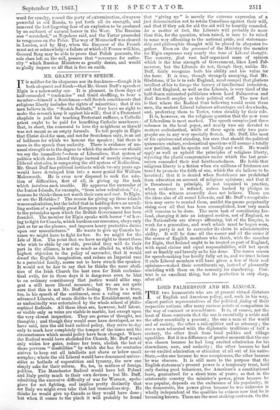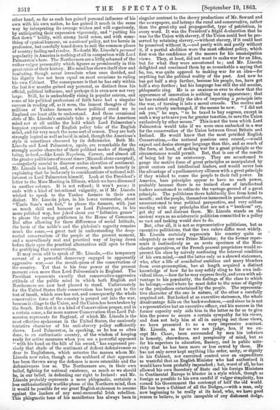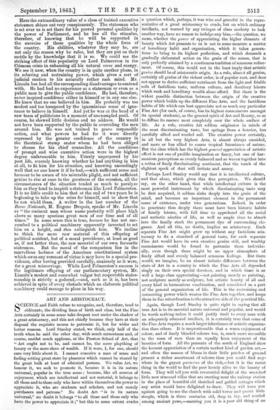LORD PALMERSTON AND MR. LINCOLN. T HE two humourists who are
at present virtual dictators of English and American policy, and, each in his way, almost perfect representatives of the political feeling of their respective nations, offer many curious points of comparison in the way of contrast or resemblance. It is, of course, not the least of those contrasts that the one is essentially a noble and the other essentially a peasant ; the one a man of the world and of society, the other a rail-splitter and an attorney ; the one a man saturated with the diplomatic traditions of half a century, the other fresh from local politics and village squabbles.. But it is a difference of greater moment that the ono was chosen because he had long excited admiration for his shrewdness, ease and audacity ; the other because he had never excited admiration or attention at all out of his native States—the one because he was conspicuous, the other because he was obscure. It is still more to the purpose that the English statesman's present power is a temporary trust, held only during good behaviour, the American's a constitutional lease, guaranteed for a short term of years ; so that in the aristocratic country the minister's power, given because he was popular, depends on the endurance of his popularity, in the democratic, the power given because he was unknown is wholly independent of the qualities he evinces now that he is becoming known. These are the most striking contrasts. On the the basis of the noble's and the plebeian's sagacity remains But, after all, it is not as representative politicians, but as much the same,—a great tact in understanding the deep- executive politicians, that the two rulers differ most widely. rooted conservatism of the people at the present moment, Mr. Lincoln certainly represents his country quite as and a marvellously real and practical way of laying down adequately as our own Prime Minister; for the former repro- before their eyes the practical alternatives still open to them sents it instinctively as an acute specimen of the Man- for gratifying that conservatism. chester operatives, or the French peasent proprietors would re- It may seem odd to speak of Mr. Lincoln,—the temporary present his class by naively confessing the internal condition servant of a powerful democracy engaged in apparently of his own mind,—and the latter only as a shrewd statesman, aggressive war,—as the mouth-piece of the conservatism of who, after a life of nonchalant ambition and many blunders the country. Yet that is his true power at the present from over-presumption, has at length acquired a distinct moment even more than Lord Palmerston's in England. The knowledge of how far he may safely cling to his own indi- President represents exactly that conservative-aggressive vidual ideas,—how far he may express freely, and even with ad- attitude of the public mind in which both English and vantage to his popularity, the feelings of the class to which Northerners are now best pleased to stand. Unfortunately he belongs,—and where he must defer to the sense of dignity for the United States their conservatism has been put to the or the prejudices entertained by the people. The represents- test of insult, which ours has not, and consequently the whole tive character of the one is nature, of the other a carefully conservative force of the country is poured out into the war, acquired art. But looked at as executive statesmen, the whole because it clings to theUnion, and theUnion has been broken by disadvantage falls on the backwoodsman,—and since he is not the South. But that it is a kind of Conservatism proper, and in a representative but an executive officer, and his success in the a certain sense, a far more narrow Conservatism than Lord Pal- former capacity only aids him in the latter so far as to give merston represents for England, of which Mr. Lincoln is the him the power to secure a certain sympathy for his views, most effective spokesman in the United States, the anxiously and does not help him at all in carrying out those views, tentative character of his anti-slavery policy sufficiently we have presented t3 us a very impressive contrast. shows. Lord Palmerston, in speaking, as he has so often Mr. Lincoln, as far as we can judge, has, if we ex- done, to an enthusiastic country, of the wisdom of keeping cept Mr. Chase, been surrounded by men his inferiors ready for active measures when you see a powerful opponent in honesty, shrewdness, and perspicuity of mind, but so "with his hand on the hilt of his sword," has expressed pre- far his superiors in education, fluency, and in public note- cisely that shade of the sentiment of defiant defensiveness so riety that he has been more or less cowed by them. He dear to Englishmen, which actuates the masses whom Mr. has not only never kept anything like order, unity, or dignity Lincoln now rules, though as the scabbard of their opponent in his Cabinet, nor exercised control over an expenditure has been thrown away the defiance is more ostensible and the so wasteful that an English Minister who had authorized it defensiveness less so. The Northerners are, in their own would have been probably impeached ; but, worst of all, he has belief, fighting for national existence as much as we should allowed his own Secretary of State and his foreign Ministers be, in our belief, in defending our right to Ireland : and Mr. in Continental Europe to bluster in a style which, though as Lincoln probably represents a more phlegmatic, certainly a foreign as possible to his own candid if vulgar simplicity, has less enthusiastically warlike phase of the Northern mind, than earned his Government the contempt of half the old world. it would be possible for our great English statesman to assume His has been a Cabinet of all the Dodges,—with a man, only against the leaders of any semi-successful Irish rebellion, now beginning to be really at its head, who we have good This phlegmatic tone of his manifestoes has always been in reason to believe, is quite incapable of any dishonest dodge. other band, so far as each has gained personal influence of his singular contrast to the showy productions of Mr. Seward and own with his own nation, he has gained it much in the same the newspapers, and betrays the rural and conservative, rather way by interpreting its average wishes and will sagaciously, than the great city and propagandist, type of patriotism, in by anticipating their expression vigorously, and " putting his every word. It was the President's frigid declaration that he foot down " boldly, with strong lucid sense, and with some- was for the Union with slavery, if the Union could best be pre- thing of cynical humour, on a national policy, not too heroic in served by retaining slavery,—without slavery, if it could best profession, but carefully toned down to suit the common-places be preserved without it,—and partly with and partly without of country feeling and resolve. No doubt Mr. Lincoln's personal it, if a partial abolition were the most efficient policy, which popularity in America is nothing at all in comparison with Lord first won the confidence of the masses for his emancipation Palmerston's here. The Northerners are a little ashamed of the views. They, at least, did not want to make war for an Idea, rather vulgar personality which figures so prominently in this but for what they were accustomed to ; and Mr. Lincoln great crisis of their history. His mind has shown itself slow and delighted and convinced them by so remarkable a saying that hesitating, though never irresolute when once decided, and he, too, was quite opposed to making war for an idea—for his dignity has not been equal on most occasions to ruling anything but the political reality of the past. And now he his own Cabinet. The consequence is that he has only within has got half a step further, because his people, too, have got the last few months gained any personal, as distinct from his half a step further • but his language has still the old secular, official, political influence, and perhaps it is even now not very phlegmatic ring. ife is as anxious as ever to show that the large. Still, he is undoubtedly rising in popular esteem, and appearance of innovation is nothing but an appearance ; that some of his political professions of faith have had a singular he has resisted steadily the idea of importing a principle into success in reading off, as it were, the inmost thoughts of the the war, of turning it into a moral crusade. The motive and millions of Yankee farmers whose political creed we in end are utterly unchanged, if the means be new. " I did not England are least able to understand. And these occasional ask you," he says, " to be taxed to buy negroes, except in dicta of Mr. Lincoln's certainly take a grasp of the American such a way as to save you far greater taxation, to save the Union mind not at all unlike the hold which Lord Palmerston's exclusively by other means." This is not the tone which Lord happiest expositions of English policy take of the English Palmerston would take if we were once embarked in a war mind, and for very much the same sort of reason. They are both for the conservation of the Union between Great Britain and strongly logical as well as lucid in mind, though the American's Ireland. He would know that the most petrified English style is sometimes obscured by its deficiencies. Both Mr. Conservatism,—the national passions once roused,—would Lincoln and Lord Palmerston, again, are remarkable for the expect and desire stronger language than this, and as much of strongly secular character of their political modes of thought, the form, at least, of making war for a great principle as the being, indeed,—like Louis Napoleon, Cavour, and almost all circumstances would permit. But, that is one of the results the greater politicians of recent times (Ricasoli alone excepted), of being led by an aristocracy. They are accustomed to —singularly careful to disavow undue elevation of sentiment, gauge the motive force of great principles as manipulated by Mr. Lincoln is as lucid, and, of course, much more homely in great orators and intellectual leaders, and would never lose explaining that he looks only to considerations of national self- the advantage of a parliamentary alliance with a great principle interest as Lord Palmerston himself. Look at the President's if they wished to rouse the people to their full power. In letter to the Mass Meeting in Illinois, which we have discussed America, bare principles appear to have no such power, in another column. It is not refined ; it won't parse; it probably because there is no trained class of intellectual ends with a kind of intentional vulgarity, as if Mr. Lincoln leaders accustomed to estimate the vantage-ground of a great wished to speak to the Yankee farmers in their own principle. The politicians there habitually live from hand to dialect. Mr. Lincoln jokes, in his lower vernacular, about mouth; and the people, themselves immersed in practical cares, "Uncle Sam's web feet," to please the farmers with just unaccustomed to true political perspective, and very seldom as much skill and humour as Lord Palmerston, in his meeting with any principles that are not a "bunkum" cry, more polished way, has joked about our "Isthmian games" get shy of and distrust them. Mr. Lincoln stands on the to please the racing gentlemen in the House of Commons. ancient ways as no aristocratic politician committed to a policy But after allowing for these differences of social latitude, so vast and tasking would dare to do. Here the extraordinary value of a class of trained executive statesmen shines out very conspicuously. The statesman who is set over us is set there for his proved personal qualities by the power of Parliament, and he has all, the stimulus, therefore, of knowing that he will be. supported in the exercise of those qualities by the whole force of the country. His abilities, whatever they may be, are not only the reason why he rules, but they are put on their mettle by the knowledge that it is so. We could see the striking effect of this popularity on Lord Palmerston in the Crimean crisis in enhancing all his natural verve and energy. We see it now, when the country is in quite another phase, in its sobering and restraining power, which gives a sort of judicial caution to his naturally rather rash mind. Mr. Lincoln has had all the corresponding disadvantages to contend with. He had had no experience as a statesman or even as a public man to give the public confidence. He had, therefore, never inspired confidence either in himself or in any one else. He knew that no one believed in him. He probably was too modest and too hampered by the ignominious sense of igno- rance to believe in himself. And yet be was at the head of a raw team of politicians in a moment of unexampled peril. Of course, he showed little decision and no address. He would not have been supported by the public in overruling the men around hint. He was not trained to grave responsible action, and what powers he had for it were directly repressed by the greater confidence of the country in the theatrical stump orator whom he had been obliged to choose for his chief counsellor. All the conditions of prompt and wise executive action were in the highest degree unfavourable to him. Utterly unprepared by his past life, scarcely knowing whether he had anything in him at all, to fit him for his situation, and knowing exceedingly well that no one knew it if he had,—with sufficient sense and humour to be aware of his miserable plight, and not sufficient genius to rise at once to the greatness of the occasion, all the circumstances of the situation tended as much to paralyze him as they tend to inspirit a statesman like Lord Palmerston. It is no little credit to him that at the end of two years he is beginning to take up the reins for himself, and to show that he can wield them. A. writer in the last number of the Revue Nationale, M. Eugene Despois, speaks of Mr. Lincoln as "the eminent man whose name posterity will place high above so many spurious great men of our time and of all times." In some sense this is true, because he has not suc- cumbed to a political machinery apparently invented to set him on a height, and then extinguish him. We incline to think the mere raw material of this offspring of political accident, but of a moral providence, at least as good as, if not better, than, the raw material of our own favourite statesman. But the moral of the comparison lies in the marvellous badneis of the American constitutional system which owes any remnant of virtue it may have to a special pro- vidence, after having provided carefully, anxiously as it were, for a great miscarriage. While Lord Palmerston's success is the legitimate offspring of our parliamentary system, Mr. Lincoln's modest and somewhat vulgar but respectable states- manship is strictly a godsend,—and, such as it is, has been achieved in spite of every obstacle which an elaborate political machinery could manage to place in his way.
































 Previous page
Previous page